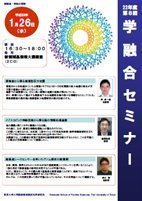AY2010 8th Gakuyugo Seminar
- Date&Time:
- Jan 26, 2011 16:30 - 18:00
- Venue:
- Large Lecture Room (2C0), New Frontier Science Bldg.

Explore the Trench-Type Massive Earthquakes from the Deep SeaFloor
Associate Professor Juichiro Ashi
In the Nankai Trough, which extends from off Tokai to off Hyuga-nada, the occurrence of large earthquakes at intervals of 100 to 200 years has been revealed from ancient documents and archaeological sites. In the sedimentary layers beneath the seafloor, there are records of earthquakes of even longer duration. In addition, submarine groundwater that gushes along faults provides us with various information on seismogenic sites. This paper introduces the state-of-the-art of deep-seabed research and the current status of trench-type giant earthquake research.

Mesoscopic Neural Circuitry as a Basis for Information Processing in the Brain
Professor Satonao Nose
Like other organs, the brain is made up of molecules and cells. Why does the brain have such advanced information processing capabilities? In order to answer this question, this year we launched a new academic research area, funded by a Grant-in-Aid for Scientific Research from the Ministry of Education, Culture, Sports, Science and Technology (http://www.meso-neurocircuitry.jp/index.html). In this lecture, I would like to introduce the comprehensive brain circuit research that this field aims for, and explain the recent technological innovations that have made this possible.

New developments in genome analysis using ultrafast sequencers
Associate Professor Yutaka Suzuki
By using so-called next-generation ultrafast sequencers, which have been developed and commercialized in recent years, it is possible to sequence hundreds of millions of bases in a single reaction. However, at present, the read length is only a few hundred bases, and it is not possible to reconstruct a long genome sequence such as the human genome by itself. In this section, we will outline what is possible using this technology and its applications.
*The contents of this page were developed based on a machine translation.

